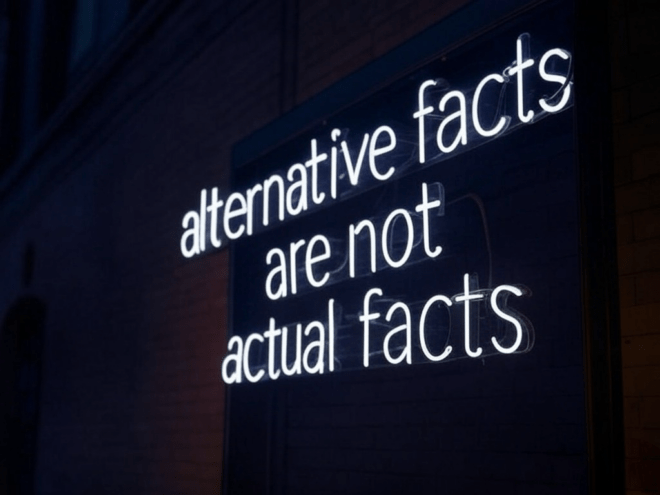
Abstract
As the world faces urgent global crises – ranging from climate change and geopolitical tensions to the rise of authoritarian regimes – the spread of “alternative facts” has amplified the difficulty of achieving consensus and collaboration. This paper delves into the psychological foundations and sociopolitical factors that predispose individuals to favour alternative facts over objective evidence. By analysing the role of values, unconscious biases and the social construction of beliefs, we aim to shed light on the forces shaping today’s fractured discourse and suggest actionable strategies to foster a more evidence-driven conversation.
Introduction
The term “alternative facts,” which entered the public lexicon in the early 21st century, epitomises a growing trend where subjective opinions and misinformation take precedence over verifiable data. In an era grappling with critical challenges like climate change, humanitarian emergencies and threats to democratic norms, the task of reconciling divergent narratives has become increasingly urgent. This paper examines the psychological mechanisms that enable the spread of alternative facts, the cognitive biases that reinforce them and the consequences for public dialogue and policy.
The Struggle Between Facts and Values
The dominance of alternative facts over objective truths often stems from a clash between facts and deeply held values. Political psychology highlights how individuals tend to favor their personal values when presented with conflicting information. As Lodge and Taber (2013) explain, emotions and preconceptions often influence decisions before logical reasoning can take hold. Consequently, people may dismiss factual evidence that challenges their values, further entrenching their beliefs.
For instance, debates on climate change reveal how individuals with strong political or economic convictions may reject scientific findings advocating for environmental reforms. This demonstrates how values can overshadow factual accuracy, fueling polarised perspectives and stalling productive discussions. In contrast, some scholars argue that fostering a shared understanding of the underlying values can facilitate dialogue, suggesting that common ground exists even in contentious debates (Fischer, 2019).
Unconscious Bias in Decision-Making
Human thought is riddled with unconscious biases that shape decision-making, often beyond the individual’s awareness. Kahneman and Tversky (1974) introduced the concept of cognitive biases, such as substitution bias, where people replace a complex question with a simpler, more comfortable one. This plays out in political contexts, where voters may evaluate candidates based on personality or party alignment rather than experience or qualifications.
Research by Redlawsk et al. (2010) reveals the impact of the “backfire effect,” where encountering negative information about a preferred candidate only strengthens existing support. This highlights how firmly established beliefs can persist, even in the face of contradictory evidence, creating fertile ground for misinformation to flourish as individuals seek out confirmation of their views. Conversely, some scholars argue that exposure to counter-attitudinal information, if framed correctly, can lead to belief change (Hollander & Bessarabova, 2020).
Repetition and Group Identity in the Spread of Misinformation
The psychology of misinformation is further reinforced by repetition and the role of social identity. Lewandowsky and Ecker (2016) argue that repeatedly hearing a statement, even a false one, can make it feel true – a concept known as the “illusory truth effect.” This helps explain why alternative facts endure within public consciousness.
Additionally, the false consensus effect – where individuals overestimate how widely their views are shared within their social groups – strengthens belief systems tied to alternative facts. For example, anti-vaccine sentiment has gained traction in certain communities, despite overwhelming scientific evidence favouring vaccines. This dynamic shows how social validation can embolden factually unsupported beliefs. However, some studies indicate that social identity can also promote adherence to factual information when aligned with community values (Jost et al., 2017).
The Influence of Education on Belief Persistence
Contrary to popular assumptions, higher education does not always lead to greater acceptance of evidence that contradicts preconceived beliefs. Research suggests that educated individuals may become more resistant to changing their views when data challenges their established worldview. The persistence of vaccine skepticism among highly educated populations underscores this paradox, demonstrating the intricate nature of belief formation and the limitations of education in correcting misinformation. In some cases, educational interventions that emphasize critical thinking and scientific literacy have proven effective in reducing belief in alternative facts (Nyhan & Reifler, 2010).
The Hawkish Bias in Policy Decisions
The impact of alternative facts extends beyond personal beliefs, influencing decision-makers and the policies they adopt. Kahneman and Renshon (2017) discuss a pervasive “hawkish bias” in policy-making, where leaders are predisposed to favor aggressive measures over diplomatic efforts. Misjudging adversaries’ motives, such biases can escalate conflicts unnecessarily, perpetuating cycles of violence and deepening global division. This tendency to prefer hawkish advisers over moderates fosters a feedback loop that undermines constructive resolution of international tensions. However, some researchers argue that awareness of cognitive biases can lead to more measured policy decisions when leaders engage in reflective thinking (Tetlock, 2005).
Actionable Solutions to Address Alternative Facts
Tackling the proliferation of alternative facts requires a multifaceted approach:
1. Strengthening Media Literacy: Educating individuals to critically assess information sources can reduce the influence of misinformation. Programs that encourage analytical thinking and fact-checking skills offer vital tools for combating cognitive biases.
2. Facilitating Open Dialogue: Promoting spaces for meaningful dialogue between opposing perspectives can help bridge divides and reduce polarisation. Bringing together diverse viewpoints can encourage participants to find common ground.
3. Harnessing Social Identity: Leveraging social identity to foster the acceptance of evidence can counteract the false consensus effect. Emphasising the widespread agreement among experts within particular communities can motivate individuals to align their beliefs with verified facts.
4. Mitigating Cognitive Biases: Raising awareness of cognitive biases can improve rational decision-making. Training individuals to recognise and overcome these biases will help them navigate complex information environments more effectively.
Conclusion
The rise of alternative facts presents a formidable obstacle in addressing today’s most pressing global challenges. By understanding the psychological and sociopolitical forces driving the acceptance of misinformation, we can identify pathways for fostering a more evidence-based public conversation. Overcoming these challenges requires a collective effort to reduce polarisation, promote critical thinking and renew a commitment to truth in shaping our shared future.
References
1. Fischer, A. H. (2019). The Role of Shared Values in Bridging Divides: A Review. Journal of Social Issues, 75(4), 1002-1020.
2. Hollander, E. P., & Bessarabova, E. (2020). The Effect of Counter-Attitudinal Information on Belief Change: A Meta-Analysis. Perspectives on Psychological Science, 15(4), 869-884.
3. Jost, J. T., et al. (2017). Ideological Asymmetry and the Politics of Belief. Journal of Personality and Social Psychology, 113(4), 525-539.
4. Kahneman, D., & Renshon, J. (2017). Why Hawks Win. Foreign Policy.
5. Kahneman, D., & Tversky, A. (1974). Judgment under Uncertainty: Heuristics and Biases. Science, 185(4157), 1124-1131.
6. Lewandowsky, S., & Ecker, U. K. H. (2016). Misinformation and Its Correction: Continued Influence and Successful Debiasing. Psychological Science in the Public Interest, 13(3), 106-131.
7. Lodge, M., & Taber, C. (2013). The Rationalizing Voter. Cambridge University Press.
8. Nyhan, B., & Reifler, J. (2010). When Corrections Fail: The Persistence of Political Misperceptions. Political Behavior, 32(2), 303-330.
9. Redlawsk, D. P., Civettini, A. J., & Emmerson, K. (2010). The Affective Tipping Point: Do Motivated Reasoners Ever “Get It”? Political Psychology, 31(4), 567-590.
10. Tetlock, P. E. (2005). Expert Political Judgment: How Good Is It? How Can We Know? Princeton University Press.



